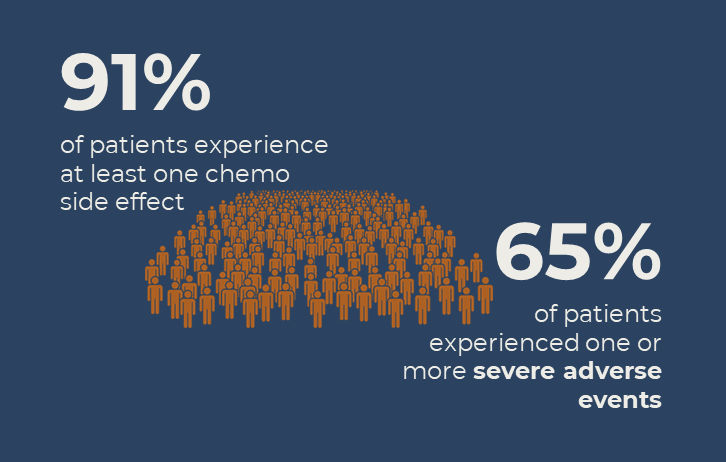Chemotherapy Side Effects and Why We Need to Prevent Them
Chemotherapy is an important tool to fight cancer, but it’s use usually comes at a cost. Many patients who endured chemo suffer from short- and long-term side effects that can be terribly damaging. Limiting chemo short term side effects is critical to being able to put up your best fight during treatment. Additionally, steps need to be taken to prevent chemotherapies severe long term side effects that are life threatening.
50 years of research and clinical use have shown high dose intravenous vitamin C (IVC) treatment can decrease the adverse effects of chemotherapy while also killing cancer cells. The High Dose Vitamin C Cancer Treatment Guide (link) summarizes evidence from over 100 studies to explain how IVC kills cancer while protecting normal cells.
Leading NIH published researchers state high dose vitamin C’s “ability to decrease chemotherapy-induced adverse effects should already make it a very valuable addition to chemotherapeutic regimens”.
Why does Chemotherapy cause side effects?
Chemotherapy drugs are designed to kill rapidly dividing cells, including cancer cells. For example, some chemotherapy drugs work by interfering with the DNA of cells, preventing them from dividing and growing. Other chemotherapy drugs can interfere with the production of proteins that cells need to survive, leading to cell death.
Unfortunately, this impact on cells affects both cancer and healthy cells. The damage to normal cells can lead to side effects that may impede the patients ability to put up their best fight against cancer.
Chemo short term side effects
These short term side effects effects have the tendency to erode quality of life and motivation when actively fighting the disease:
Fatigue
Nausea and vomiting
Persistent pain
Decreased appetite
Increased risk of infection
Mouth sores
Brain fog
Sleep problems
Long term side effects (late effect) of chemotherapy
Successfully surviving the battle against cancer is mentally and physically draining. Chemotherapy is often a decisive aspect of beating cancer, but the cost of using the medication can result in damage to organs and body systems that may not be repairable.
Considering the severity of chemo late effects, taking steps to limit normal cell damage and boosting the ability for repair should be a priority of all cancer patients. Late effects of chemo include:
Heart problems: Chemotherapy increases the risk of heart problems like congestive heart failure, coronary artery disease, and irregular heartbeat.
Lung damage: Some patients experience damage to the lungs from chemotherapy which includes changes to how well the lungs function, inflammation to the lungs, thickening of the lung lining, and problems with difficulty breathing.
Hormone issues: Chemo can also affect the endocrine system; this is comprised of glands and other organs that create hormones, eggs, and sperm. Chemo treatments can trigger early menopause in women, and infertility in both men and women.
Nerve damage: Long term nerve damage is associated with chemotherapy which can be experienced as loss of feel sensation in feet and/or hands, and chronic pain.
Cognitive challenges: Chemo has been attributed to long term cognitive problems such as impaired learning, memory, and focus.
New cancer: The DNA damage to normal cells caused by chemo increases the risk of forming new cancer later in life.
Chronic fatigue: Some cancer survivors struggle with constant fatigue for years after finishing treatment.
Four things you can do to reduce side effects from chemo
While it is not always possible to eliminate the risk of side effects from chemotherapy, there are several steps that patients can take to reduce their risk and manage any side effects that do occur:
1. High dose IV Vitamin C: This IVC treatment guide summarizes the evidence that shows high dose vitamin C infusions protect normal cells from the toxic effects of chemo while also killing cancer cells.
2. Follow a healthy lifestyle: Eating a nutritious diet, exercising regularly, and getting enough sleep can help support your overall health and reduce the risk of chemo side effects.
3. Limit toxic substances: Limiting intake of alcohol and heavily processed foods (e.g. soft drinks, candy, chips) reduces the chance of adverse chemo effects.
4. Stress reduction: Patients and survivors should implement stress reduction activities such as yoga or meditation.
How does high dose IV vitamin C reduce side effects from chemotherapy?
Chemo drugs attempt to kill cancer cells (and inadvertently damage normal cells) by interfering with DNA, RNA, or proteins synthesis. The High Dose Vitamin C Cancer Treatment Guide (link) summarizes 50 years of research and clinical use that shows vitamin C protects normal cells from the damaging effects of chemo while simultaneously attacking cancer cells.
Vitamin C is a powerful antioxidant that can protect the DNA of normal cells by neutralizing harmful molecules known as free radicals. Free radicals are unstable molecules that can damage DNA, proteins, and other molecules in the body, leading to cell damage and death. In addition, vitamin C can help repair damaged DNA by supporting the production of enzymes that are involved in the repair process.
Take your best fight to cancer while protecting your health
When fighting cancer, the focus should remain on defeating the disease. But patients need to take action early in the diagnosis and treatment to protect their body. IVC has proven to be a safe and effective combination treatment to protect the body from chemo and synergistically kill cancer cells.
Medical Advice Disclaimer:The information, including but not limited to, text, graphics, images and other material contained on this website are for information purposes only and was based on the latest research accessible to the author at the time of publication. No material on this site is intended to be a substitute for professional medical advice, diagnosis or treatment. Always seek the advice of your physician or other qualified health care provider with any questions you may have regarding a medical condition or treatment and before undertaking a new healthcare regiment, and never disregard professional medical advice or delay in seeking it because of something you have read on this website.






